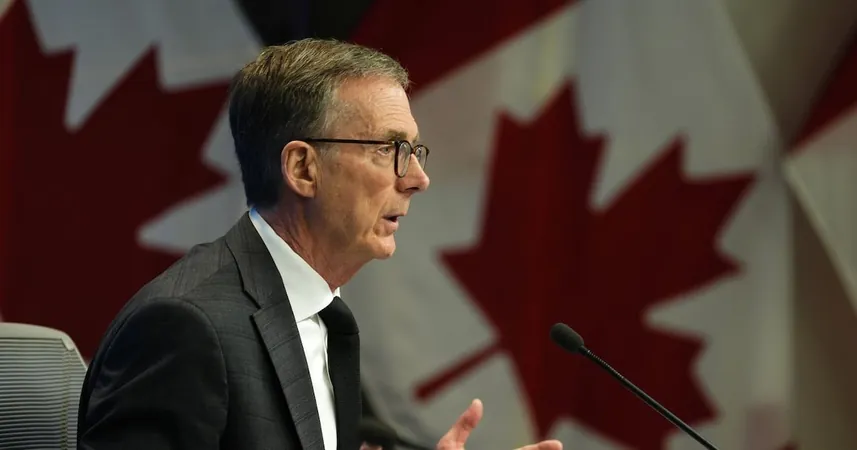
Canada's Trade Dilemma: Time to Break Free from U.S. Dependency, Warns BoC Governor
2025-09-23
Author: Liam
A Wake-Up Call for Canada's Trade Strategy
In a striking speech delivered to Saskatchewan business leaders, Tiff Macklem, Governor of the Bank of Canada, admitted that the nation has lingered too long in its reliance on the United States for trade. He emphasized the urgent need for Canada to shake off its economic dependency and diversify its markets.
Tariff Troubles and Economic Stagnation
Macklem highlighted the detrimental impact of U.S. President Donald Trump's tariffs on Canadian industries, resulting in a notable slowdown in economic growth. He pointed out that the Canadian economy is now on a "permanently lower trajectory" due to these external pressures.
Comparisons to Past Crises
Drawing parallels to the 2008-09 financial crisis, Macklem lamented that despite widespread calls for diversification back then, little progress was made. He urged Canadian businesses to recapture their urgency in adapting to market shifts.
No Cyclical Recovery in Sight
This time around, Macklem warned that there won't be a natural rebound for the economy unless decisive action is taken by both business leaders and policymakers. He stressed that the U.S.-Canada trade relationship, while enduring, requires a strategic overhaul.
Interest Rate Adjustments Amid Economic Weakness
With economic indicators pointing to weakness, the Bank of Canada recently lowered its benchmark interest rate to 2.5%. The decline in real GDP during the second quarter of 2025 was notable, particularly as Canadian exports faced significant challenges, especially in the sectors hit hardest by tariffs.
Seeking New Markets Beyond the U.S.
Macklem urged for a concerted effort to develop new global markets and improve internal trade barriers within Canada. He spoke about enhancing transportation corridors and port infrastructure to ease access to international markets, thereby decreasing dependency on the U.S.
Dismantling Interprovincial Barriers for Productivity
To boost productivity, Macklem advocated for the removal of interprovincial trade barriers and harmonizing regulatory frameworks across provinces. He believes these measures could elevate Canada's economic trajectory beyond pre-tariff levels.
A Call for Unified Leadership
"Canadian leaders—business, political, and economic—must chart a new course," Macklem implored, acknowledging that the time for change was overdue but insisting that there’s no time like the present to start.
Political Pressures on Monetary Policy
Macklem also weighed in on Trump's ongoing attempts to influence the U.S. Federal Reserve, cautioning about the implications of undermining central bank independence. He praised his U.S. counterpart, Jerome Powell, for navigating these challenges effectively.
Global Ripple Effects of U.S. Financial Stability Threats
Lastly, Macklem warned that emerging threats to financial stability in the U.S. could reverberate worldwide, underscoring the interconnected nature of global markets and the need for vigilance.









 Brasil (PT)
Brasil (PT)
 Canada (EN)
Canada (EN)
 Chile (ES)
Chile (ES)
 Česko (CS)
Česko (CS)
 대한민국 (KO)
대한민국 (KO)
 España (ES)
España (ES)
 France (FR)
France (FR)
 Hong Kong (EN)
Hong Kong (EN)
 Italia (IT)
Italia (IT)
 日本 (JA)
日本 (JA)
 Magyarország (HU)
Magyarország (HU)
 Norge (NO)
Norge (NO)
 Polska (PL)
Polska (PL)
 Schweiz (DE)
Schweiz (DE)
 Singapore (EN)
Singapore (EN)
 Sverige (SV)
Sverige (SV)
 Suomi (FI)
Suomi (FI)
 Türkiye (TR)
Türkiye (TR)
 الإمارات العربية المتحدة (AR)
الإمارات العربية المتحدة (AR)